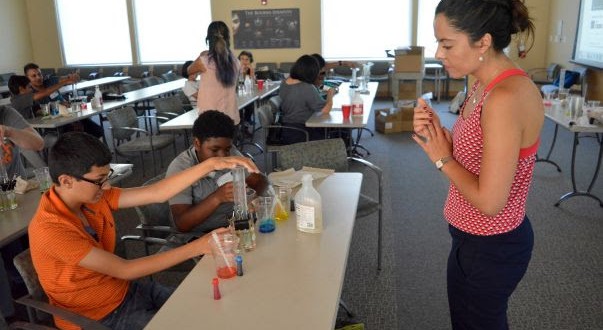RIVERSIDE, CA— More than 60 middle and high school students from California and Arizona came to the University of California, Riverside’s Bourns College of Engineering on Saturday, Sept. 10, to learn how nanotechnology and biology are increasingly being brought together to address important problems in a variety of fields. The event was hosted by UCR and the Johns Hopkins University Center for Talented Youth, or CTY.
The workshop was part of CTY’s Science and Technology series, which offers one-day experiences that connect academically gifted students and their parents with scientists at leading research institutions across the country to encourage their interest in science, technology, engineering and math majors and careers.
The workshop at UCR highlighted how nanotechnology—science, engineering, and technology conducted at the nanoscale—is being used to enhance biological systems, as well as the inverse situation, where biology is providing new means for addressing critical challenges in the field of nanotechnology. The event included faculty seminars and hands-on demonstrations, an undergraduate research panel discussion, and tours of UCR’s Center for Nanoscale Science and Engineering Nanofabrication Facility and Central Facility for Advanced Microscopy and Microanalysis.
“We wanted to transform our guests into nano-bioengineers for the day so they could experience firsthand how research in this area is addressing many unmet needs, not only in biology and medicine but also in energy, electronics, the environment and numerous other fields,” said Masaru Rao, an associate professor of mechanical engineering and materials science and engineering at UCR. “The students were extremely talented, very engaged, and we hope that some of them are inspired to consider pursuing educational paths and eventual careers in nanotechnology and biology.”
“This is the first time UCR has hosted a CTY event, and based on its success, we look forward to the opportunity to do so again in the future.”
Rao hosted the workshop with fellow BCOE faculty and staff, including: Victor Rodgers, professor of bioengineering; Elaine Haberer, associate professor of electrical and computer engineering; Hideaki Tsutsui, assistant professor of mechanical engineering; Monica Wilhelmus, assistant professor of mechanical and chemical and environmental engineering; Jun Wang, director of student development and international initiatives; and Rosie Zhang, professional development officer. The workshop also involved the efforts of more than a dozen BCOE graduate and undergraduate student volunteers, who served as guides, demonstration leaders, and discussion panelists.
Established in 1979, The Johns Hopkins University Center for Talented Youth is a non-profit center that identifies and develops the talents of academically gifted K-12 learners worldwide. CTY identifies young people of great academic promise through its annual talent search and nurtures their intellect and personal growth through summer programs, online courses, and other services and resources.
Support for the event was provided by CTY, UCR BCOE, and National Science Foundation grants CMMI-1254999, OISE-1545852, ECCS-1406795, and CBET-1606181.
 Westside Story Newspaper – Online The News of The Empire – Sharing the Quest for Excellence
Westside Story Newspaper – Online The News of The Empire – Sharing the Quest for Excellence




